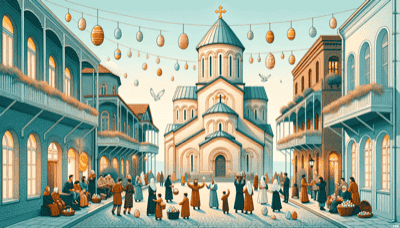We're here to help you keep count of the days to or since a date. Just click the button below and enter your chosen date to get started. Also choose the suggested days or search for a special day above #countingthedays

Background: Orthodox Easter, known as "აღდგომა" (Aghdgoma) in Georgian, is one of the most significant and celebrated religious holidays in Georgia. It follows the Julian calendar, which often results in a different date for Easter than that observed by Western Christian churches following the Gregorian calendar.
History & Traditions: The history of Orthodox Easter in Georgia is deeply entwined with the country's adoption of Christianity as a state religion in the 4th century. Traditions have been preserved over centuries and are reflective of both religious significance and local customs.
Preparation: The observance begins with a period known as Great Lent, a time of fasting and reflection. The week before Easter, called Holy Week, includes daily services and preparations for the celebration.
Holy Saturday Vigil: The festivities start on the night of Holy Saturday with a midnight service. People gather at churches holding candles, which are lit to symbolize Jesus Christ’s resurrection and the defeat of darkness by light.
Easter Sunday: On Easter Sunday, after the church service, families and friends come together to celebrate. A feast is prepared that includes an array of traditional Georgian dishes, breaking the fast.
Egg Decoration: Coloring eggs red is a widespread tradition representing the blood of Christ. These eggs are often decorated with various patterns and sometimes compete in egg-tapping games.
Greeting: A common greeting during this time is "Christ has risen!" to which one would respond "Indeed He has risen!"
Activities: On this day:
Orthodox Easter Sunday encapsulates both solemn reverence and joyous celebration within Georgian culture, highlighting its rich religious heritage interlaced with strong community bonds.